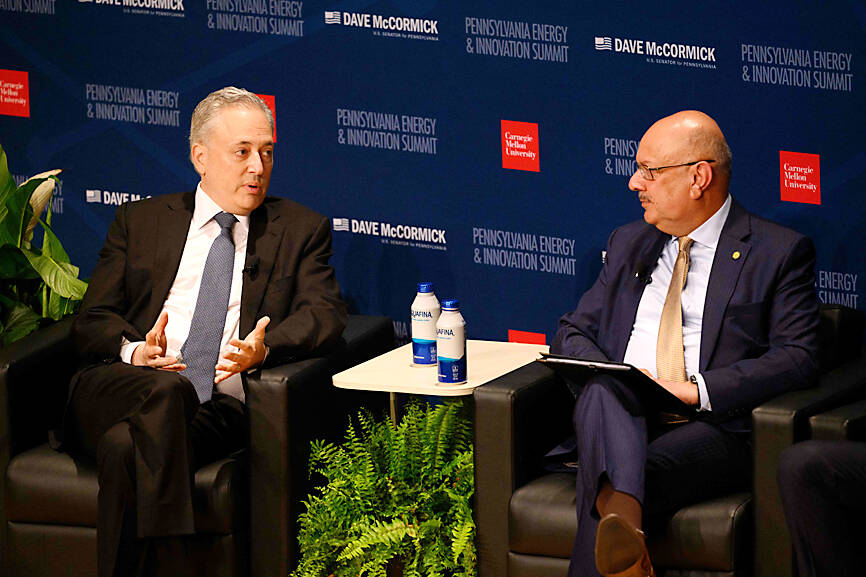White House AI adviser David Sacks on Tuesday defended the decision by the administration of US President Donald Trump to allow Nvidia Corp and Advanced Micro Devices Inc to resume sales of some artificial intelligence (AI) chips to China, reversing export curbs imposed by the US earlier this year.
Allowing Nvidia to restart shipments of its H20 chips would position the US to compete more effectively abroad and blunt efforts by Chinese tech giant Huawei Technologies Co (華為) to gain a bigger slice of the global market, Sacks said in an interview with Bloomberg Television.
“We are not selling the latest and greatest chips to China, but we can deprive Huawei of having this giant market share in China that they can then use to scale up and compete globally,” he said. “The policy is nuanced and it makes a lot of sense.“

Photo: AFP
The move is seen as a win for Nvidia chief executive officer Jensen Huang (黃仁勳), who last week met with Trump after spending months arguing for a letup in US restrictions on sales to Chinese customers.
“Jensen has been making the case publicly for competing in China and there are a lot of merits to the argument,” Sacks said.
Revived sales of the H20 promise to restore billions in revenue for Nvidia this year, according to the company.
The H20 was originally designed to comply with export controls imposed under the administration of former US president Joe Biden, but in April, the Trump administration tightened those rules to block sales to China of the H20 and AMD’s MI308 chip without a license.
The tighter curbs prompted Nvidia to announce a US$4.5 billion writedown on H20 chip inventory in its fiscal first quarter and warn of an additional potential loss of US$8 billion in sales.
AMD said it would take an US$800 million charge for its second quarter of this year.
Sacks pushed back on criticism that allowing H20 sales to China poses a security risk, calling the H20 “a deprecated chip.”
He warned that other countries are choosing between US and Chinese technology.
“If you don’t let these countries buy American tech, you’re pushing them into China’s arms,” he said.
Trump officials had previously said that the H20 chip sales curbs were not up for negotiation.
Sacks said that the policy shift fits into what he described as a broader push to establish an “American AI stack” — encompassing chips, operating systems and the AI models that run on them.
“It’s a zero-sum game,” he said. “We want it all to be American-made and American-powered. If we hobble our own companies, we’re handing an advantage to China.”
The reversal follows months of diplomacy between Washington and Beijing. As part of a trade truce unveiled last month, the US has eased some restrictions on exports, including chip-design software, in exchange for greater Chinese cooperation on sales of rare earth minerals — a key input for many high-tech products.

Nvidia Corp chief executive officer Jensen Huang (黃仁勳) on Monday introduced the company’s latest supercomputer platform, featuring six new chips made by Taiwan Semiconductor Manufacturing Co (TSMC, 台積電), saying that it is now “in full production.” “If Vera Rubin is going to be in time for this year, it must be in production by now, and so, today I can tell you that Vera Rubin is in full production,” Huang said during his keynote speech at CES in Las Vegas. The rollout of six concurrent chips for Vera Rubin — the company’s next-generation artificial intelligence (AI) computing platform — marks a strategic

REVENUE PERFORMANCE: Cloud and network products, and electronic components saw strong increases, while smart consumer electronics and computing products fell Hon Hai Precision Industry Co (鴻海精密) yesterday posted 26.51 percent quarterly growth in revenue for last quarter to NT$2.6 trillion (US$82.44 billion), the strongest on record for the period and above expectations, but the company forecast a slight revenue dip this quarter due to seasonal factors. On an annual basis, revenue last quarter grew 22.07 percent, the company said. Analysts on average estimated about NT$2.4 trillion increase. Hon Hai, which assembles servers for Nvidia Corp and iPhones for Apple Inc, is expanding its capacity in the US, adding artificial intelligence (AI) server production in Wisconsin and Texas, where it operates established campuses. This

US President Donald Trump on Friday blocked US photonics firm HieFo Corp’s US$3 million acquisition of assets in New Jersey-based aerospace and defense specialist Emcore Corp, citing national security and China-related concerns. In an order released by the White House, Trump said HieFo was “controlled by a citizen of the People’s Republic of China” and that its 2024 acquisition of Emcore’s businesses led the US president to believe that it might “take action that threatens to impair the national security of the United States.” The order did not name the person or detail Trump’s concerns. “The Transaction is hereby prohibited,”

Garment maker Makalot Industrial Co (聚陽) yesterday reported lower-than-expected fourth-quarter revenue of NT$7.93 billion (US$251.44 million), down 9.48 percent from NT$8.76 billion a year earlier. On a quarterly basis, revenue fell 10.83 percent from NT$8.89 billion, company data showed. The figure was also lower than market expectations of NT$8.05 billion, according to data compiled by Yuanta Securities Investment and Consulting Co (元大投顧), which had projected NT$8.22 billion. Makalot’s revenue this quarter would likely increase by a mid-teens percentage as the industry is entering its high season, Yuanta said. Overall, Makalot’s revenue last year totaled NT$34.43 billion, down 3.08 percent from its record NT$35.52